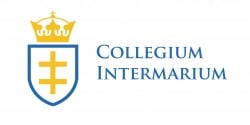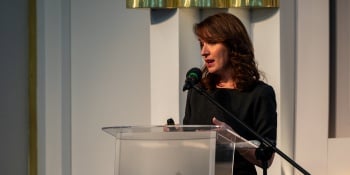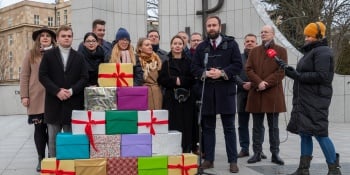Published: 31.10.2024

• In the three years of Collegium Intermarium’s existence, more than 400 people have benefited from this private university’s teaching offerings. The college has conducted more than 30 conferences and seminars. It has cooperated with universities from the EU and the US, and lecturers from the US, UK, Japan, Greece, Lithuania, Serbia, France, and Hungary have taught within its walls.
• The success of these three years validated assumptions about establishing a university appealing to academic freedom and the ideal of classical education; carrying out the educational mission in an intimate environment; and providing direct contact between professors and students.
• An unprecedented attack by the government administration on the Collegium Intermarium (CI) has been underway for nearly four months.
• This is the culmination of threats issued by the Polish government as early as January 2024, when the university appeared on the “Sienkiewicz blacklist” (a list of right-wing, conservative, and Christian organizations to be put under reinforced scrutiny, that was established by PM Donald Tusk’s Culture Minister and leaked to the media last January) followed by Justice Minister Adam Bodnar’s media attack on CI and its former rector.
• The government’s assault on CI’s foundations occurred through initiating ten inspections and withholding research-program funding, contrary to existing agreements.
• The state agency from which CI leased its premises, on commercial terms, refused to bring the premises into full compliance with educational-purpose regulations, which led to the termination of the lease.
• Collegium Intermarium began defending itself against the government’s attack by securing the fate of its students and facilitating their admission to other law schools.
• Having protected its students from the consequences of the government’s attack, the university is proceeding to report publicly on the scale of the attack and the imminent threat of the termination of Collegium Intermarium’s academic activities.
Collegium Intermarium was established on April 29, 2021, and is one of the youngest universities in Poland. A private investor solely established and financed it. Collegium Intermarium is a private university, offering college curricula, postgraduate studies, and courses – generally for a fee, which is no small challenge in the Polish and European environment of universal free higher education.
Anglo-Saxon models inspired the founding of Collegium Intermarium. It was to have the character of a small university, in which select academic staff could educate a few dozen people per year through a system of tutoring and individual training of students and learners. Thomas Aquinas College and Magdalen College, both of which hosted CI representatives, exemplify the idea of small elite colleges in the US.
In its initial phase of building market share and academic reputation, the university focused activities on implementing research and publication programs, as well as specialized postgraduate studies and courses. However, since its first year of operation, Collegium Intermarium has also been operating a full-time, five-year law-degree program. The university’s law-degree program has emphasized elements unique to the context of the domestic legal market. First, a graduate is expected to acquire unique knowledge and competencies, resulting from a deep understanding of the philosophy of law, the roots of legal institutions, and the political system. As a result, the graduate must be prepared to interpret laws, apply norms, and even create laws in accordance with the full complexity of the legal and social system and constitutional axiology. Secondly, each student maintains contact with practitioners, attorneys, legal advisers, judges, and prosecutors, all of whom impart knowledge and share their experiences. These insights are usually only acquired by students at the professional-apprenticeship stage. During the university’s initial period of development, the number of full-time studies remained intentionally small. A total of 12 first-, second-, third-, and fourth-year students graduated during the last academic year.
The international dimension of the university – since 2021, more than 400 people have benefited from the university’s range of academic offerings
An important element of Collegium Intermarium’s mission is the internationalization of studies through cooperation with other institutes committed to the ideal of classical education. This approach recognizes the contemporary value of immersing students in the works of great masters, which are the pillars of civilizational identity. In the 2023/2024 academic year, the Collegium Intermarium welcomed visiting professors representing, among others: Aristotle University of Thessaloniki (Greece), Ave Maria School of Law (USA), Kaunas University of Applied Sciences (Lithuania), University of Kragujevac (Serbia), European Center for Law and Justice (France), University of Tokyo, Soka University of Tokyo, and Tokyo University for International Studies (TUFS).
The Collegium also conducts research programs (funded through grants available to all universities in Poland) and organizes meetings, debates, and scientific conferences. Collegium Intermarium is a co-organizer of events both in Poland and abroad. (For example, from October 26-28, 2023, the university was a partner and co-sponsor of the scientific conference “The Influence of Christianity on Law” in Córdoba, Spain, along with the University of Córdoba, the University of Navarra, and the Ave Maria School of Law.) The university has also established partnerships with the Ave Maria School of Law in Florida (USA) and the ISEP University in Lyon.
In its first years of operation, Collegium Intermarium offered several postgraduate study courses (for example, the highly popular “Classical Europe” and “NGO Management” courses). International students of the two-year English-language Master of Laws in Human Rights also completed their diploma theses. To date, more than 400 students have benefited from the university’s range of academic offerings.
As of the new academic year (2024/2025), the postgraduate course offerings have been expanded to include “Education Management,” “History of Art,” “Rhetoric,” “Psychology of Marriage and Family” (in cooperation with an external institution), “Thomistics,” “Faith and Science,” and a course on “Methodology of Work in Administrative Affairs in Local Government.” The university has developed three types of Latin-language courses.
Following a natural course of development, the university prepared an application to the Minister of Science and Higher Education to institute a new curriculum: “Philosophy.”
Among the more than 30 conferences and seminars organized by Collegium Intermarium in Poland, specially deserving of emphasis are those that established the reputation of the university as a space for promoting the ideals of academic freedom and classical education. A list of these events is included at the end of this statement.
Collegium Intermarium on the “Sienkiewicz list” – How the Polish left-liberal government is destroying a private university whose conservative values it dislikes
Despite its successes, the university has faced a number of media attacks, motivated mainly by media distaste for the classical ideal of education and CI’s association with a conservative political model. It also became the victim of attacks as a place of professional engagement for practicing lawyers against whom Donald Tusk’s government has taken direct offensive action. Active politicians, including the incumbent Minister of Justice Adam Bodnar, joined the media attacks on the university, and this had a significant impact on CI’s image and brand. The university’s name was also placed on the “Sienkiewicz list” in leaked government correspondence, along with dozens of other organizations, marking it for special politically motivated oversight by the public administration. As a result, payments of research funds specified in the university’s contracts with the science and higher education ministry – originating from programs available to all universities in Poland – were temporarily halted in early 2024. In the middle of the year, the ministry ordered an extraordinary inspection by the Polish Accreditation Commission (PKA), which was to take place during the summer vacation period. This provided no opportunity to showcase classes with students and no chance to present the full array of university activities. At the same time, the government initiated an audit of eight research, publishing, and conference programs at the university; in October, this expanded to include another audit area.
Given the scale of the government’s attack, and prioritizing the safety of its students, the Collegium Intermarium supported the efforts of full-time students to begin their studies at other academic institutions. Pending the cessation of government attacks, the university was also forced to suspend enrollment of new full-time students. The decision to take this step turned out to be justified, as the students did not become collateral damage of the attack on CI.
Prior to completion of the audit proceedings, and contrary to the agreements, the government withheld funding for research programs involving renowned professors and scientists. At the same time, after the change in government, a dispute had been growing over the space CI rented commercially from a government agency, and this resulted in termination of the lease.
Previous sponsors withdrew their support, fearing reprisals from a government known for its ruthless legal violations in persecuting political opponents.
Forced to curtail academic activities and focus on defending the university in multiplying inspection proceedings, the authorities of Collegium Intermarium estimate that the government’s goal is ultimately to eliminate CI from the Polish academic scene. The attack is intended as a warning that will have a chilling permanent effect on circles promoting the ideal of academic freedom.
After securing the fate of the students and drawing up comprehensive reports on CI research programs, university authorities gave the lawyers of the Ordo Iuris Institute the proper powers of attorney to continue the dispute with the government. They then resigned from their positions and convened meetings of the university’s collegiate bodies for November.
Today, only mass support can come to the university’s rescue.
We believe that we can still preserve the idea of Collegium Intermarium.
Warsaw, October 29, 2024
Dr. Artur Górecki – Professor & Rector of Collegium Intermarium
Jerzy Kwaśniewski, Esq. - Chairman of the Board of Trustees of Collegium Intermarium
Conferences and seminars organized by Collegium Intermarium (selected):

• “In the United States, here in Poland, and around the world, we are experiencing a cultural revolution. We are literally at war,” said Tina Descovich, co-founder of Moms for Liberty, during a meeting in Warsaw, encouraging action to protect children from gender ideology.

03.02.2025
The following updates and adds to an earlier list of violations that was published in October 2024.

• The collection of signatures for the Polish citizens’ legislative initiative “Stop the Pornography Drug” has come to an end.

17.12.2024
In a conversation with Frenchman Olivier Bault, Professor Anna Labno, a professor of constitutional law who teaches at the Tarnów Academy in Poland, talks about a year of breaking the rule of law in the name of restoring the rule of law.